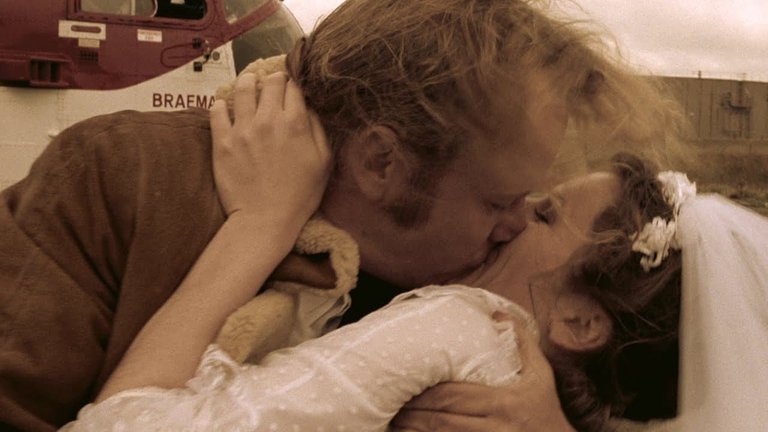Film Review: Breaking the Waves (1996)

In certain countries many big and important films can arrive to theatres years after the premiere or not arrive at all. The author of this review had plenty of opportunity to witness this phenomenon in the last decades of 20th Century. In 1980s it was quite common even for the biggest Hollywood blockbusters to arrive two or four years after original premiere. In 1990s situation with big Hollywood productions improved but, on the other hand, the same thing began to happen with great non-Hollywood films, even those worshipped by critics and winning prestigious awards. At certain occasion, the long wait was quite worth it, like in the case of Breaking the Waves, 1996 drama by Lars von Trier, film that, despite winning Grand Prix and Cannes Film Festival, has arrived in Croatian cinemas nearly four years later.
The plot is set in 1970s and takes place in small seaside village in Scottish Highlands, a place dominated by Calvinist sect that imposes strict rules of conduct on its members. The protagonist is Bess McNeill (played by Emily Watson), young and naive woman who has spent some time in psychiatric institution after the death of her brother. Her only true friend is widowed sister-in-law Dodo (played by Katrin Cartlidge), an outsider who works as a nurse. Bess, much against the will of the community elders, marries another outsider, Danish oil rig worker Jan (played by Stellan Skarsgård). After their idyllic honeymoon ends and Jan has to return to oil rig, Bess is devastated and asks God to bring him back early. Her prayers are answered in a very cruel way – Jan is injured at the oil rig and paralysed from neck down. While he recuperates, Jan, aware that he wouldn’t make love to her any more, asks her to have sex with other men and later describe him the experience in order to give him reason to live. After some hesitation, Bess listens to him but promiscuous lifestyle is difficult to hide in small community. While elders want to cast Bess out, Dodo and kind-hearted Dr. Richardson (played by Adrian Rawlins) see in Bess’ behaviour symptoms of mental illness. Bess is, however, convinced that she is doing God’s will and that her actions are the only way to save husband’s life and restore his health.
Danish director Lars von Trier has, due to numerous controversies and eccentric behaviour, created reputation of enfant terrible of European cinema. Breaking the Waves, on the other hand, paint rather different picture of a religious mystic and von Trier after looked more like Christian film maker in the company of Kieszlowski, Tarkovski and Bresson rather than iconoclast like Ken Russell or Buñuel. Whatever ideological or religious alignment von Trier picked, one thing is certain – he has great talent, which is probably the most evident in this film. His script is very simple and von Trier himself has described film as “simple love story”. Yet, this simple story is basis for an epic story that easily, and despite difficult subject and some rather unpleasant scenes, keeps audience’s attention for more than two and half hours. At first glance, Breaking the Waves doesn’t look very glamorous. The setting is dour and unattractive piece of Northern Europe, while von Trier makes it even less attractive through the use of techniques and styles that look like they belong to famous Dogma 95 manifest – handheld cameras, semi-documentary style, lack of music and authentic locations. On the other hand, von Trier also finds ways and good reasons for straying from those principles. This is best seen in the film’s structure that consists of seven chapters. Each of them starts with images of brightly coloured and nearly idyllic Scottish landscape accompanied by some of 1970s pop hits. This represents huge and effective contrast to the dour and mostly depressive content in the rest of the film.
Von Trier directs film with great skill, but his efforts would have been for naught without really great cast. Emily Watson, who was at the time relatively unknown stage actress, simply shines in her film debut as Bess. Few actresses would have handled such complicated and demanding roles so well – Bess is going to emotional roller coaster from ecstasy to agony. Watson with her natural charm and attractive yet down-to-earth looks easily wins audience, even when her actions would have caused ridicule rather sympathy. Watson has handled Scottish accent well and her role was even more complicated in the scenes during which she has imaginary conversations with God.
Skarsgård, one of von Trier’s old collaborators, is very good in the role of intimidating but kind-hearted whose love towards his wife would nevertheless lead to tragic consequences. The only voice of reason is character of Dodo, who is played well by Katrin Cartlidge, somewhat underrated British actress. The gradual transformation of that character from sceptic into believer would ultimately help audience reach strong emotional catharsis near the end.
Although Breaking the Waves might not be everyone’s cup of tea, it is probably the most accessible of all films in von Trier’s filmography and it could be recommended as an example of all the positive things associated with non-Hollywood or art cinema.
RATING: 9/10 (++++)
Blog in Croatian https://draxblog.com
Blog in English https://draxreview.wordpress.com/
Leofinance blog https://leofinance.io/@drax.leo
Unstoppable Domains: https://unstoppabledomains.com/?ref=3fc23fc42c1b417
Hiveonboard: https://hiveonboard.com?ref=drax
Bitcoin Lightning HIVE donations: https://v4v.app/v1/lnurlp/qrcode/drax
Rising Star game: https://www.risingstargame.com?referrer=drax
1Inch: https://1inch.exchange/#/r/0x83823d8CCB74F828148258BB4457642124b1328e
BTC donations: 1EWxiMiP6iiG9rger3NuUSd6HByaxQWafG
ETH donations: 0xB305F144323b99e6f8b1d66f5D7DE78B498C32A7

https://twitter.com/21393347/status/1619219917966036993
The rewards earned on this comment will go directly to the people( @drax ) sharing the post on Twitter as long as they are registered with @poshtoken. Sign up at https://hiveposh.com.